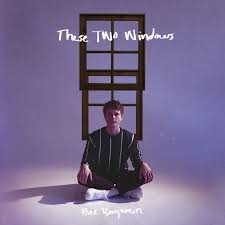6/30/20

Michael Kiwanuka, Home Again (2012)
My introduction to him was last year’s incredible album Kiwanuka, which easily made my best list for the year. The texture and complexity of it blow my mind. Now, hearing this 2012 record for the first time, I find it every bit as good; a disc I’ll return to frequently, I predict. Like Kiwanuka, I hear subtleties on my second pass through I didn’t hear the first time. His voice is impeccable, always delivering perfect phrasing for every moment. “Rest” put me at peace like few songs can. It makes me wonder why I didn’t like Kiwanuka’s 2016 album, Love & Hate. My records show I listened to it, or part of it. Not sure what I didn’t hear then, but I’m going to revisit (probably tomorrow) and find out, because I may be obsessed with Michael Kiwanuka.
Pigeonhole: Indie rock, indie folk
6/29/20

Jason Mraz, Look For The Good (2020)
After seven albums, Mraz remains a happy guy with a great voice. Apparently this is Mraz’s white-boy reggae moment, as every song has some degree of reggae influence. There are lots of simple lyrics, like “make love not war” and “I was raised to love my neighbor.” Yet there’s still something refreshing about it all. I even like “Hearing Double,” a song that could easily turn annoying, as he repeats every line twice (thus the title). But like everything Mraz offers here, it works. The album is bookended by two extremely uplifting songs, the title track and “Gratitude,” in which Mraz repeats the album’s opening lyric “look for the good.” Mraz is part owner of a restaurant a few blocks from my apartment, Café Gratitude, so perhaps you see a pattern. He is also an activist and the founder of the Jason Mraz Foundation, which supports charities in the areas of human equality, environment preservation and education.
Pigeonhole: Folk pop, reggae
6/28/20

Ray LaMontagne, Monovision (2020)
This is a simple, stripped down collection that gently washes over the ears and leaves a nice, soothing residue. It’s entirely a one-man show; LaMontagne does it all, the instrumentation, the vocals and the engineering. Perhaps this solitary approach was the inspiration behind the album title. There are moments reminiscent of Neil Young, and even the Everly Brothers (on “Weeping Willow”). When he sings a line that’s been sung a million times, like “Lately, it’s the mornings that I miss her most of all,” there’s something refreshing in his emotional interpretation. There’s always something deeply human about LaMontagne’s music, and this album feels like a gift to a troubled people. Particularly delightful: “I Was Born To Love You,” “Summer Clouds,” “We’ll Make It Through” and “Highway to the Sun.”
Pigeonhole: Folk rock,
6/27/20

Vampire Weekend, Modern Vampires of the City (2013)
They developed the cuts for this album at sound checks during the Contra tour. It’s considered an experimental record with extensive use of pitch shifting, which involves manipulating an original pitch higher or lower, a technique used extensively in cartoons, particularly Alvin and the Chipmunks, Tweety and Daffy Duck. Such experimentation is expected from the audiophile members that make up Vampire Weekend. The complexity and depth of this album landed it on several best of lists of the decade.
Pigeonhole: Indie rock, baroque pop
6/26/20

Goldfrapp, Tales of Us (2013)
These are mostly trance-inducing, slow-burn ballads that deviate from Goldfrapp’s typical electronic leanings. Every song title is a given first name (other than “Stranger”), including “Annabel” inspired by a novel about an intersex child raised as a boy, and “Clay,” based on a letter written by a World War II veteran to his male lover. The album was promoted with five different short films, including a 30-minute anthology of the entire collection. Alison Gsldfrapp’s crystal clear, breathy vocals are nothing short of mesmerizing. The arrangements are fairly sparse, which gives space for Alison’s vocal range and versatility.
Pigeonhole: Synth pop, folktonica
6/25/20

Bessie Jones, Get In Union (2020)
Clapping. Lots of hand clapping. I guess because, when you’re a slave, you use whatever instruments you can come up with. Alan Lomax took on the project of compiling these working songs sung by Bessie Jones. The result was this sixty-song, two-and-a-half hour collection. Jones’ grandfather was brought to the New World in 1843 as a slave and fathered Jones in 1902. She was raised in the Gullah-Geechee traditions of the American south and had her first child at the age of twelve. Beginning in 1963, she was part of the Georgia Sea Island Singers, which toured colleges and festivals for the better part of two decades, including performing at Jimmy Carter’s inauguration. Some of these songs include background chatter, of particular note is the ending of “Going to Chattanooga” where she talks about singing and “twisting” (dancing) while her parents weren’t watching.
Pigeonhole: Gospel
6/24/20

Phoebe Bridges, Punisher (2020)
She’s only 25-years old but already Phoebe Bridges is quickly becoming a musical powerhouse. This is her second solo album in addition to her acclaimed work with Better Oblivion Community Center and Boygenius. Mostly a mix of melancholy tunes, her tender voice is accessible and appealing. The only cut that doesn’t work for me is the opener, “DVD Menu,” which feels superfluous. The next two cuts (the album’s singles) are simply incredible.
Pigeonhole: Indi rock, folk rock, emo
6/23/20

The National, Trouble Will Find Me (2013)
This isn’t my favorite album by these guys, but they always set a high bar for themselves. This, their sixth album, was nominated for Best Alternative album of the year behind the singles “Demons” and “Don’t Swallow the Cap.” Lead singer Matt Berninger’s morose and monotone vocals always work for me, whereas similar bleakness from the likes of Nick Cage or Leonard Cohen just make me want to open a vain and bleed out.
6/13/20

DJ Boring, Like Water (2020)
This album was released yesterday and after a couple passes I’m sold. There are some nice big electronic moments here, although there’s also some fat that could be trimmed from almost every cut. He sometimes spends a little too much time getting to the point. But overall it delivers bass-heavy, lo-fi house beats. DJ Boring is Austrian-born Londoner Tristan Hallis who, apparently, has a hot A/V set he produced with New York visual artist Amir Jahabin. It’s obvious these tunes would pair nicely with visual affects. Can’t wait for that kind of live experience in a club again, someday.
Pigeonhole: Dance, electronic
6/12/20

Jagwar Ma, Howlin (2013)
This debut from Australian trio Jagwar Ma delivers a steady neo-psychedelic beat likened to Primal Scream or the Stone Roses. “Come Save Me” stands out with soring vocals that could have been a Beach Boys hit in the day. The heaviest trance is courtesy of “Four,” a six-and-a-half minute, swirling mix of sound behind a deep pulse. Tasty mix of percussion and tribal beats on “Exercise.” They’ve toured in support of two other favorites: Tame Impala and The xx.
Pigeonhole: Psychedelic rock, alternative dance
6/11/20

Rhye, Woman (2013)
Rhye is the Canadian duo of Mike Milosh and Robin Hannibal. Milosh’s contralto androgynous voice could easily be confused for a woman’s, which makes the title track a bit ironic. If anything he could be compared to sultry legend Sade. The first two songs are sensual soul pop songs that set the tone for what comes next. Multiple instruments are used here, including trombone, violin, harp, flugelhorn, trumpet, clarinet, flute and saxophone. But subtle seems to be the underlying mood.
Pigeonhole: Alternative R&B, downtempo
6/10/20

The Brothers Johnson, Right On Time (1977)
“Strawberry Letter 23” was a quasi hit in 1977 for The Brothers Johnson. Written by Shuggie Otis, the 66-year old just released his own version of it and, I’ll be kind, it’s an admirable attempt. To truly appreciate this song, you must hear the Brothers Johnson version. Which I did, then checked out the rest of it. The opening cut “Runnin For Your Lovin” is a fun horn-backed jam. “Free Yourself, Be Yourself” is beautiful, for no other reason than its cheesiness (think theme from The Love Boat). The instrumental “Q” has some fun moments — a tinkling of a triangle, a couple killer Hammond lines. “Right On Time” couldn’t be more fun, or more dated. It doesn’t really stand up in the twenty-first century. But the Seventies were a fun time in music, and this album is proof. Otis deserves thanks for this record. As silly as it can sometimes be, it at least got me to hear “Strawberry Letter 23” for the first time in decades. There’s some similarities to Sly and the Family Stone, like “Brothers Man,” which is an incredible funky jam. “Never Leave You Lonely” sounds like a campy song from a discount wedding, but eventually evolves into a groovy jam. The record wraps with “Love Is,” a pretty dreadful ballad with an awkwardly uplifting message. As for the Brothers, Louis died in 2015; couldn’t find much info on line about George.
Pigeonhole: Funk, R&B
6/9/20

José James, Heaven On The Ground (2013)
He’s been called a jazz vocalist for a hip-hop generation. This is a totally laid back album, to the point of nearly inducing hypnotics. The title track is a tasty slow groove, as is the amazing “Do You Feel,” meanwhile “Tomorrow” is a bit tedious. There are two versions of “Come To My Door” (written by Emily King). James does a super groovy take, then is joined by King for an acoustic version. Both are so good I can’t pick a favorite.
Pigeonhole: Neo soul, modern jazz
6/8/20

Bobbie Humphrey, Dig This! (1972)
Dizzy Gillespie saw her perform in a talent show in the late Sixties and encouraged her to pursue a music career. This jazz flautist later became the first female instrumentalist ever signed to the prestigious jazz label Blue Note, and went on to perform with Duke Ellington and George Benson. I chose to feature this album, although I also heard Blacks And Blues (1999), considered her best. I actually found Dig This! more to my liking. The first two cuts have excruciatingly long intros but eventually get into a groove. It’s the third cut, an instrumental cover of “Smiling Faces Sometimes” (a hit by The Undisputed Truth in 1971) that boosts the record’s credibility. “Virtue” is vintage groovy vibrations, while “I Love Every Little Thing” is a delicious flute instrumental. “Nubian Lady” is another keeper. There are no vocals here, which begs the question: how much flute music can you take in one sitting (my answer is: about an album and a half). She’s now 70 and lives in Marlin, Texas; her last studio album was released in 1994.
Pigeonhole: Jazz fusion
6/7/20

Phoenix, Bankrupt! (2013)
Ti Amo (2017) made my top ten list that year, and it’s better than this one, but not by much. Bankrupt! grows on me the more I hit repeat. This is their fifth album and it follows the hugely successful Wolfgang Amadeus Phoenix. Right out of the gate it’s a big electronic explosion (“Entertainment” and “The Real Thing”) behind the familiar and wonderful vocals of Thomas Mars (husband of movie director Sofia Coppola I just learned). The title track is a marvelous electronic instrumental for the first four and a half minutes before Mars chimes in to wrap it up. I really can’t get enough of these guys.
Pigeonhole: Synth-pop, electronica
6/6/20

LA Priest, GENE (2020)
I have varying degrees of excitement for the new music I write about each day. Even the best stuff is sometimes just okay. Other days it’s like finding a secret treasure I get to keep! Not that this album is a perfect 10 rating. In fact, most of it I’m not even that thrilled about. But the opening three cuts (and the three edited versions at the end) are absolutely awesome. Not sure I can even pick a favorite, but I’ll go with “What Moves.” “Beginning”sounds like a modern-day incarnation of the Talking Heads or Bryan Ferry. But I can’t stop listening to all three! Sadly, the album kind of falls apart after that. It’s almost like those three songs were produced by a different person than the rest of the album. The internet says: “LA Priest is the name Sam Dust, late of Late of the Pier, adopted to release his beguiling space-pop-psyche solo work following the demise of the band he founded when still in his teens.” Whatever any of that means.
Pigeonhole: Electronica
6/5/20

Trey Songz, “How Many Times” (2020)
This single by three-time Grammy nominated artist is in response to the civil unrest following the police killing of George Floyd in Minneapolis. Songz sings the line “How many bro thers gotta die/How many more times?” backed by a full gospel choir. No doubt a trove of music will come out of these times. This just happened to be the first one that caught my attention, and I like it quite a bit. A portion of the proceeds will benefit Black Lives Matter and the National Bail Fund Network.
Pigeonhole: RnB, soul
6/4/20

Mayer Hawthorne, Where Does This Door Go (2013)
He’s heavily influenced by classic soul and Motown, but there are cues from across the musical spectrum here, which makes this a truly unique collection. Andrew Mayer Cohen (aka Mayer Hawthorne) draws influence from the likes of Curtis Mayfield, Isaac Hayes and Smokey Robinson. But there are also Steely Dan moments, like “Wine Glass Woman,” and a hip-hop element (Kendrick Lamar co-wrote “Crime” and makes a cameo). All of which results in something entirely new and refreshing.
Pigeonhole: Retro soul, pop and R&B
6/3/20

Alec Benjamin, These Two Windows (2020)
Several of these cuts were released as singles over the last several months, all meeting with my full-throated approval. Now the balance of this record is out, and it doesn’t disappoint. This is Benjamin’s second full album and I have to say, there’s something very appealing about his vocal chops and his writing ability. I’m indifferent about only two cuts (“Must Have Been The Wind,” and “Alamo”); the rest I really, really like. This 26-year-old hails from my hometown (Phoenix, AZ) which isn’t necessarily a hotbed of musical talent, although I have high hopes for a long career in this case. (Also see M4S post 3/12/20)
Pigeonhole: Pop
6/2/20

Karl Bartos, Off the Record (2013)
Bartos is old school electronica. As one of the original members of the legendary German electronic band Kraftwerk, Bartos could easily be considered one of the pioneers of the genre. This is the third solo album from the now 68-year old and it definitely recalls a sound from the past. There are hints of Pet Shop Boys in songs like “Without A Trace” and “Rhythms.” “The Binary Code” sounds like a video game malfunctioning for a minute and a half, while “Musica Ex Machina” keeps a beat to what sounds like my building’s fire alarm accidentally going off. There is no new ground broken on this record. But there’s something nostalgic and charming about it, which is payoff enough.
Pigeonhole: Electronica
6/1/20

Lydia Loveless, Somewhere Else (2014)
I rounded out my Best of 2014 list (just uploaded, see tab above) with this record from an artist new to my ears. She was only 23 when she recorded this and it was her third album! She’s a youngin’ with a healthy respect for history. “Hurt So Bad” was inspired by the tempestuous relationship between Elizabeth Taylor and Richard Burton, whose ten-year marriage ended in 1974. It’s possible even Loveless’ parents weren’t born then.
Pigeonhole: Alternative country, honky tonk
